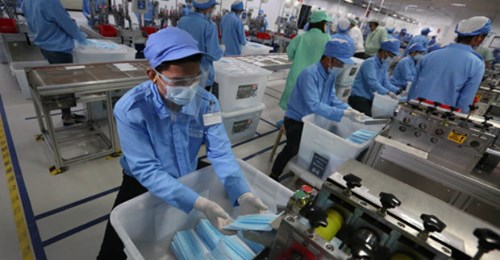MANILA, Philippines — The Department of Health (DOH) rejected on Saturday a call from some business groups to exempt factory and office workers from wearing face shields at work, saying personal protective equipment (PPE) remains crucial in fighting the new coronavirus disease (COVID-19) despite improving public health indicators.
“We will not compromise [on] this position because science and evidence say that when you wear a mask you can decrease the incidence or probability of getting infected by as much as 70 percent,” Health Undersecretary Maria Rosario Vergeire said at the Laging Handa briefing.
If a person wears a face shield on top of the mask and practices physical distancing, he or she could reduce the chance of getting infected by as much as 99 percent, Vergeire added.
“Our point and position from the start is we will push and advocate wearing face masks, wearing face shields, practicing physical distancing, washing hands to everybody,” she said, urging the public to keep on observing health protocols to stay safe.
Effect on productivity
“Let us not be complacent when we see improvements in our health system, in our number of cases. The virus is still here. Let us remain vigilant. We must always be aware and conscious,” she said.
The health official made the assertion after four business organizations asked the Inter-Agency Task Force for the Management of Emerging Infectious Diseases (IATF) to exempt factories and office workers from wearing face shields, saying the transparent covers could affect the workers’ vision, physical safety and productivity.
“This is particularly a serious concern for the construction and manufacturing industries, such as electronics and automotive, which work with minute parts and sensitive production lines,” the groups told the IATF in a letter dated Sept. 21.
“As earlier mentioned, we are one with government in helping ensure that the workplace is safe for our stakeholders,” they said. “But except for the front-liners, we respectfully take exception to the wearing of face shields inside the office and factories for the rest of our employees, since this can adversely affect their vision, physical safety and productivity.”
The letter was signed by George Barcelon, president emeritus of the Philippine Chamber of Commerce and Industry (PCCI) and a private sector representative in the Legislative-Executive Development Advisory Council.
The other signatories were Sergio Ortiz-Luis Jr., PCCI treasurer and president of the Philippine Exporters Confederation; Edgardo Lacson, PCCI auditor and chair of Employers Confederation of the Philippines; and Francis Chua, PCCI director and chair of the Philippine Silk Road International Chamber of Commerce.
However, incumbent PCCI president Benedicto Yujuico did not sign the letter.
Isolation rooms
The businessmen also complained about being required to put up an isolation room for every 200 employees when it is the government’s responsibility to take care of infected people because “obviously we are not competent to handle this.”
They also asked for the suspension of the Data Privacy Act to allow the public to know who exactly had been infected with coronavirus—a request that the National Privacy Commission later rejected for being unscientific and unethical.
“There’s no scientific proof that publicly naming COVID-[19] infected individuals has public health benefits on a pandemic response. What has been proven is that this disease causes discrimination, shaming and has led to social vigilantism,” NPC Chair Raymund Liboro said in a statement.
“It will prevent COVID positive individuals and their close contacts from coming out to seek testing and treatment. [This will just be] making it more difficult for authorities to control this pandemic,” Liboro added.
The business groups also asked the IATF to let all public utility vehicles resume operations and to further ease restrictions on activities earlier classified as nonessential, including noncontact sports.
“One good example [is the operation of] golf clubs, which are very, very low risk,” they said.


